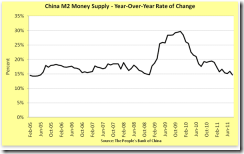My hunch about China's bursting bubble has been getting some validation.
The Chinese government has announced that it will intervene by buying shares of select banking stocks.
From the Financial Times (bold emphasis added)
The Chinese government will boost its stakes in the country’s largest banks, as it attempts to shore up slumping financial stocks and to restore investor confidence.
Central Huijin, the domestic arm of China’s sovereign wealth fund, will purchase shares in Agricultural Bank of China, Bank of China, China Construction Bank and Industrial and Commercial Bank of China, the official Xinhua news agency announced on Monday. Xinhua added that the purchases by Huijin – its first such public intervention since a similar decision at the onset of the financial crisis three years ago – would “support the healthy operations and development of key state-owned financial institutions and stabilise the share prices of state-owned commercial banks”.
The announcement came too late for the Chinese stock market, which had closed at a 30-month low, but had an immediate effect on late trading in Hong Kong. ICBC’s Hong Kong-listed shares, which had been down 3 per cent, rallied to close up 1 per cent
Beijing also allowed the renminbi to record its biggest one-day gain in years on Monday. It rose 0.6 per cent against the dollar, squeezing traders who have been betting that the currency will weaken in tandem with a slowing economy.
Adding to my earlier commentary, a bust process-in China’s bubble economy or following an earlier money supply growth driven boom-is also a result of a rising yuan.
Corporate finance analyst and author Kel Kelly at the Mises.org provides an eloquent explanation
Therefore, letting its currency rise will cause a recession, since reduced money-supply and credit-growth rates are the usual initiating factors that bring on recessions (reduced rates of spending alone can cause recessions, but they are usually preceded by prior reductions in money and credit). It has been rapid increases in money and credit that have driven the current boom in China, and it will be the reduction in the growth rate of those variables that causes the bust.
The economic boom in China has consisted of rapid increases in true economic growth accompanied by — but not driven by — an increase in monetary spending. The increase in monetary spending, in turn, has been driven by wild credit growth, and has resulted in massive overinvestment in particular industries. There has been no shortage of commentaries and videos highlighting building booms, mania-type herd-mentality home buying, and the mass creation of buildings, shopping malls, and even multiple entire cities in China that stand unoccupied — all dramatic yet classic symptoms of credit bubbles.
So like the Eurozone, we see China’s government providing explicit support by jawboning or providing promises to buttress her banking sector.
However, the problem is that China’s current currency policies appear to contradict this (see chart below from Mr. Kelly).
The left hand does not know what the right hand is doing.
Again, we should see if such guarantees would suffice to forestall a bust or if market forces will continue to put pressure on China’s government, not only to make promises, but to forcefully act.
Very interesting times indeed.

No comments:
Post a Comment